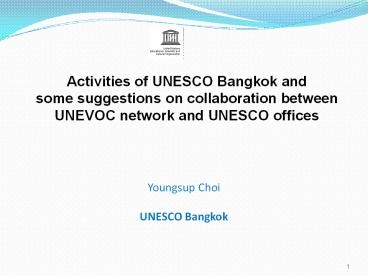Day 2 Module 2 PowerPoint PPT Presentation
1 / 7
Title: Day 2 Module 2
1
Activities of UNESCO Bangkok and some
suggestions on collaboration between UNEVOC
network and UNESCO offices
Youngsup Choi UNESCO Bangkok
2
I. Activities of UNESCO Bangkok
- 1. Study on StW information base
- To examine the current situation of StW
information base and to identify the areas of
intervention from UNESCO - Mainly focusing on developing countries but
including some middle income countries of
different sub regions - Progress so far and next steps
- Oct 2010 - Jan 2011 Preparation of study plan
- Feb-Jul 2011 country studies
- Aug 2011 synthesis workshop
- Sep-Oct 2011 drafting synthesis report
- Nov-Dec 2011 Publication of booklet
3
- 2. TVET policy review in Lao PDR and Cambodia
- Part of strategic upstream policy advice of
UNESCO offices (HQRBFO) - Identification of the challenges and, areas of
policy dialogue incl. capacity development
through meetings w/ govt civil stakeholders - 2010-Mar 2011 Preparatory stage incl. missions
and desk research - Cambodia Field mission (Jun), Review report
(Jul-Sep), natl W/S (Oct 2011) - Lao PDR Field mission (Jul, Sep), Review report
(Oct-Nov) - Issues identified
- Lack of coordination b/w key Mins, depts,
centrl-provn govt. - Limited demands for semi-skilled limited job
opportunity of TVET (esp., sec. level TVET) ? low
enrol. of sec. TVET large drop-outs - Limited alignment w/ socio-economic strategy Not
even govt driven, but supply-driven (TVET
programs being congested to the areas which are
easy to attract (miss- or little informed)
students)
4
- 3. Vocationalization of Secondary education
- As part of secondary education regular program
and CapEFA Laos - Diversification of TVET supply Introduction of
integrated school (gen ed voc ed), or inclusion
of voc subjects to gen curriculum - Supports to Lao PDR policy W/S study visit
(Jul 2011) - Review on the experiences of Thai, Aus, Mal and
South Korea (W/S) - Examine actual situation in Thai and Mal (study
visit) - Planned policy dialogue Sep-Dec 2011
- Publication on vocationalization of Sec. Ed.
- In association w/ UNEVOC Bonn
- Incl. Thai, Aus, Mal, China, and UZB (TBD)
- Review on the experiences and implications for
ASP countries - Country study (Oct), draft report (Dec),
publication (Feb 2012)
5
- 4. Some more
- 3rd World TVET Congress Shanghai, China, May
2012 (2nd Congress Seoul, Korea, 1999) - Preparation of Global TVET report regional
report by BKK - Regional consultation TBD
- UNESCO-APEID conference on Creativity and
Entrepreneurship Jakarta, Dec 2011 - Suggestion on career guidance for C E not
only the reform of education programs but need
for concern about the ways of identifying the
talents and supporting the sustained development - On the way of negotiation w/ Korean govt
- Skills development for Creative Economy in
Thailand - Development of UN wide action plan for the next 5
yrs to support the skills development for CE in
Thai.
6
II. Suggestions on cooperation
- Key challenges for TVET in ASP
- Limited/scattered region-specific knowledge base
compared to the extremely diverse policy requests
from the member states, especially reflecting the
specific/unique socio-economic-cultural situation - Limited number of experts with understanding on
the regional contexts and with the expertise on
specific issues - Limited within-country capacity on specific
policy issues and over-dependence on external
expertise which are altogether hindering the
endogenous policy development and implementation
7
- How to overcome this situation? Never by UNESCO
or Intl Orgs alone - Continued and concerted efforts of external and
internal expertise towards the development of
internal capacity - More radically, led by internal expertise? e.
g. Joint study/research led by internal
expertise and supported by external expertise - Role of UNEVOC centers Leading agency of
internal capacity development while mobilizing
external resources - Role of Intl Orgs Raising the issues and
providing technical resources - However, dilemma for Intl Orgs? Pressure for
showing results?

